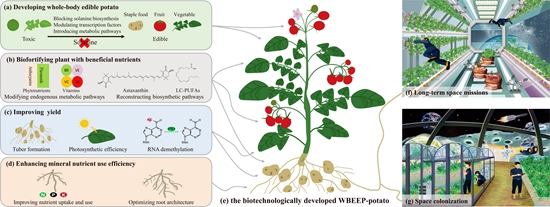Scientists Identify Biotech Strategies for Space Agriculture Development
In recent years, agencies in the United States (NASA), Europe (ESA), China (CNSA), Russia (RAKA), and other countries have formulated a series of deep-space exploration plans. Furthermore, NASA and CNSA even plan to build permanent settlements on the moon and the mars. With the resurgence of interstellar exploration and possible interstellar migration, the food supply is the first problem to solve. Relying on transporting food from the earth would not only be prohibitively costly but also limit the amount and variety of the food. Therefore, establishing an efficient space farming system based on space crops and achieving food self-sufficiency is crucial for long-term space missions. However, the existing crops cannot meet the requirements of cost effectiveness and productivity of space farms.
Recently, the Functional Plant Cultivation and Application Research Group from the Institute of Urban Agriculture, Chinese Academy of Agricultural Sciences (IUA, CAAS), has proposed a whole-body edible and elite plant (WBEEP) strategy for space crops improvement. Relying on plant biotechnology, the WBEEP strategy aims to develop crops with more edible parts, richer nutrient content, and higher yield and mineral nutrient use efficiency to space farms. Because of its simple horticultural and food processing requirements, and its advantages on growth and propagation, the potato was selected to demonstrate how bioengineering can be leveraged to create WBEEP-potato for space farming.
The scientists made the following recommendations:
Developing whole-body edible plant for WBEEP-potato.
Biofortification with beneficial nutrients for WBEEP-potato.
Improving yield for WBEEP-potato.
Enhancing mineral nutrient use efficiency for WBEEP-potato.
The scientists emphasized that, as more anti-nutritional factor biosynthesis mechanisms will be revealed, and multi-species universal strategies for improving nutrition, yield, and fertilizer use efficiency will be developed, the WBEEP approach is expected to be implemented on more crops. Moreover, the incremental advances in developing WBEEPs might be beneficial not only for space agriculture but also for conventional agriculture and urban agriculture.
The study entitled “Biotechnological development of plants for space agriculture” has been recently published in Nature Communications.
This work was supported by the National Natural Science Foundation of China (31972469, U1804231, and 31672206), the Agricultural Science and Technology Innovation Program of the Chinese Academy of Agricultural Sciences (34-IUA-02) and other funds.

Paper link: https://doi.org/10.1038/s41467-021-26238-3
By Ren Maozhi (renmaozhi01@caas.cn)
-
 Apr 18, 2024Opening Ceremony of the Training Workshop on Wheat Head Scab Resistance Breeding and Pest Control in Africa Held in CAAS
Apr 18, 2024Opening Ceremony of the Training Workshop on Wheat Head Scab Resistance Breeding and Pest Control in Africa Held in CAAS -
 Apr 03, 2024IPPCAAS Co-organized the Training Workshop on Management and Application of Biopesticides in Nepal
Apr 03, 2024IPPCAAS Co-organized the Training Workshop on Management and Application of Biopesticides in Nepal -
 Mar 28, 2024Delegation from the School of Agriculture and Food Science of University College Dublin, Ireland Visit to IAS, CAAS
Mar 28, 2024Delegation from the School of Agriculture and Food Science of University College Dublin, Ireland Visit to IAS, CAAS -
 Mar 25, 2024Director of World Food Prize Foundation visited GSCAAS
Mar 25, 2024Director of World Food Prize Foundation visited GSCAAS -
 Mar 20, 2024Institute of Crop Sciences (ICS) and Syngenta Group Global Seeds Advance Collaborative Research in the Seed Industry
Mar 20, 2024Institute of Crop Sciences (ICS) and Syngenta Group Global Seeds Advance Collaborative Research in the Seed Industry
